This article includes a list of references, related reading, or external links, but its sources remain unclear because it lacks inline citations .(January 2013) |
This is a list of Slovene writers and poets in Hungary.
This article includes a list of references, related reading, or external links, but its sources remain unclear because it lacks inline citations .(January 2013) |
This is a list of Slovene writers and poets in Hungary.
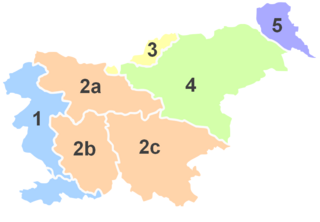
Prekmurje is a geographically, linguistically, culturally and ethnically defined region of Slovenia, settled by Slovenes and a Hungarian minority, lying between the Mur River in Slovenia and the Rába Valley in the westernmost part of Hungary. It maintains certain specific linguistic, cultural and religious features that differentiate it from other Slovenian traditional regions. It covers an area of 938 square kilometers (362 sq mi) and has a population of 78,000 people.

Turnišče is a town in Slovenia. It is the seat of the Municipality of Turnišče.

Hungary competed at the 1964 Summer Olympics in Tokyo, Japan. 182 competitors, 150 men and 32 women, took part in 111 events in 17 sports.

The Hungary national handball team is administered by the Hungarian Handball Federation.
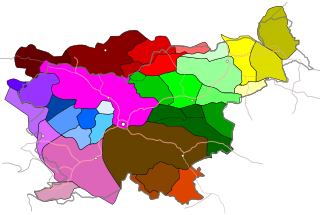
Prekmurje Slovene, also known as the Prekmurje dialect, East Slovene, or Wendish, is a Slovene dialect belonging to a Pannonian dialect group of Slovene. It is used in private communication, liturgy, and publications by authors from Prekmurje. It is spoken in the Prekmurje region of Slovenia and by the Hungarian Slovenes in Vas County in western Hungary. It is closely related to other Slovene dialects in neighboring Slovene Styria, as well as to Kajkavian with which it retains a considerable degree of mutual intelligibility and forms a dialect continuum with other South Slavic languages.

Sándor Terplán was a Hungarian Lutheran priest and writer.

József Klekl was a Slovene Roman Catholic priest from Prekmurje and politician in Hungary, writer, governor of the Slovene People's Party (Slovenska lüdska stranka), later a delegate in Belgrade. Klekl was an active proponent of the independence of the Slovene March in Hungary (Slovenska krajina), and for some time fusion with the State of Slovenes, Croats and Serbs.

The Kisfaludy Society was a literary society in Pest, founded in 1836 and named after Károly Kisfaludy, who had died in 1830. It held monthly meetings and was a major force in Hungarian literary life, giving prizes, funding the collection of folk songs, and sponsoring the publication of works like Imre Madách's The Tragedy of Man. It dissolved in 1952.
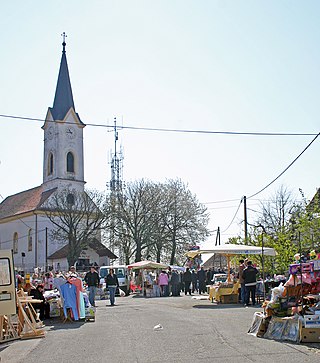
Pečarovci is a village in the Municipality of Puconci in the Prekmurje region of Slovenia.
The Prekmurje Slovenes are Slovenes from Prekmurje in Slovenia and Vendvidék and Somogy in Hungary. The Prekmurje Slovenes speak the Prekmurje Slovene dialect and have a common culture. The Hungarian Slovenes (Porabski Slovenci) and Somogy Slovenes also speak the Prekmurje Slovene dialect.

Ferenc Xaver Berke de Nagybarkóc was a Hungarian Slovene Lutheran pastor and writer.
Gergely Luthár was a Slovene landowner, notary, and writer in Hungary.
Mihály Kolossa was a Slovene ploughman and writer in Hungary.

József Klekl Jr. was a Slovene writer, journalist, and Roman Catholic priest in Hungary, later in Prekmurje.
The first New Testament in Prekmurje Slovene appeared in 1771: the Nouvi Zákon of István Küzmics. This was distinct from Bible translations into Slovene, such as that of Miklós Küzmics.

Irén Pavlics was a Hungarian Slovene author and editor.
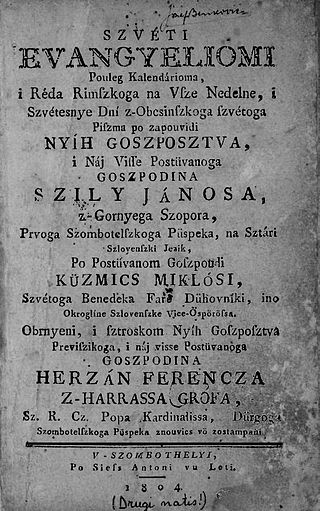
Szvéti evangyeliomi, later Szvéti evangeliomi, is the first Catholic translation of the Bible into Prekmurje Slovene. It was written by Miklós Küzmics (1737–1804), the dean of Prekmurje and the Rába Valley. The publication in 1780 was financed by János Szily, the first bishop of Szombathely. Szvéti evangyéliomi had a significant role in the formation of standard Prekmurje Slovene. It was a standard for numerous works published in Prekmurje from 1780 until 1920.
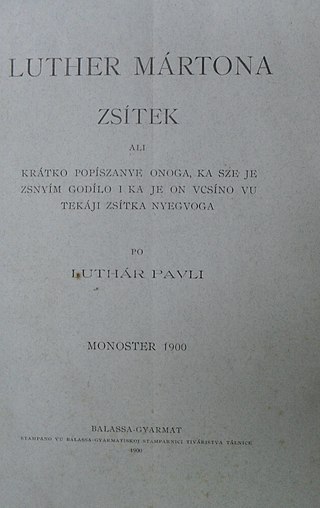
Pál Luthár was a Slovene Lutheran teacher, organist, and writer.